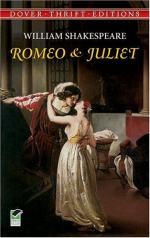|
This section contains 6,067 words (approx. 21 pages at 300 words per page) |

|
SOURCE: "Love, Death, and Patriarchy in Romeo and Juliet," in Play, Death, and Heroism in Shakespeare, The University of North Carolina Press, 1989, pp. 131-47.
Here, Farrell asserts that the intense fear of death among the characters in Romeo and Juliet reflects the breakdown of the patriarchal structure of Verona as well as its ability to inspire fantasies of immortality.
Recent criticism has tended to depict patriarchy primarily as an authoritarian institution for the regulation of society.1 Where Elizabethan theorists praised the system for its order, we now have difficulty seeing beyond its flagrant injustices and limitations, especially its misogyny. Yet repression is not the whole picture. What made patriarchy tolerable, even valuable, to so many Elizabethans? No one in Shakespeare's Verona, for example, openly rebels against its patriarchs. Like Romeo, Juliet blames fate that she "must love a loathed enemy" (1.5.141); she desperately tries to placate her father with...
|
This section contains 6,067 words (approx. 21 pages at 300 words per page) |

|


